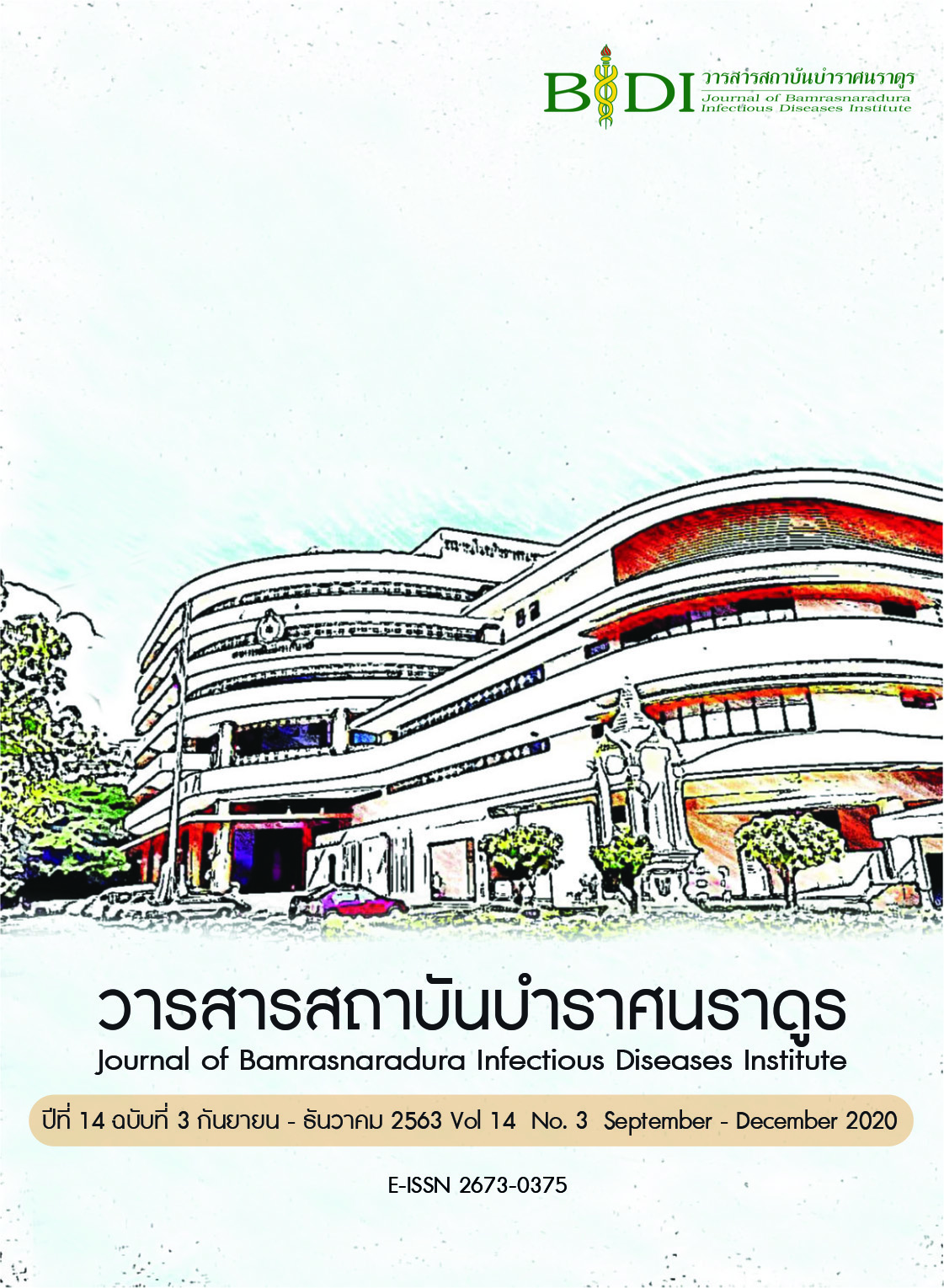ผลของโปรแกรมการสนทนาแบบสร้างแรงจูงใจต่อการควบคุมระดับน้ำตาลในเลือดสำหรับผู้ป่วยเบาหวานชนิดที่ 2
Main Article Content
บทคัดย่อ
การศึกษานี้เป็นวิจัยกึ่งทดลอง แบบหนึ่งกลุ่มวัดผลซ้ำ วัตถุประสงค์หลักคือ ศึกษาผลของโปรแกรมการสนทนาแบบสร้างแรงจูงใจต่อการควบคุมระดับน้ำตาลในเลือดในระยะภายหลังจบโปรแกรมครั้งที่ 4 ทันที หลังจบโปรแกรม 3 เดือน และ 6 เดือน สำหรับผู้ป่วยเบาหวานชนิดที่ 2 วัตถุประสงค์เฉพาะคือ 1) เปรียบเทียบความร่วมมือในการควบคุมระดับน้ำตาลในเลือด ก่อนและหลังได้รับโปรแกรม 2) เปรียบเทียบระดับน้ำตาลในเลือดของผู้ป่วยเบาหวานชนิดที่ 2 ภายหลังจบโปรแกรมครั้งที่ 4 ทันที หลังจบโปรแกรม 3 เดือน และ 6 เดือน เครื่องมือคือ 1) โปรแกรมการสนทนาสร้างแรงจูงใจจำนวน 4 ครั้งแต่ละครั้งห่างกัน 1 เดือน ใช้เวลา 5-10 นาทีต่อครั้ง 2) แบบบันทึกการสนทนาสร้างแรงจูงใจ 3) แบบบันทึกระดับน้ำตาลในเลือด 4) เครื่องมือสำหรับเจาะเลือด ประชากรคือ ผู้ป่วยที่เข้ารับการตรวจรักษาโรคเบาหวาน ณ แผนกผู้ป่วยนอกของโรงพยาบาลชุมชน โรงพยาบาลทั่วไป และโรงพยาบาลศูนย์สังกัดกระทรวงสาธารณสุขระหว่างปี พ.ศ.2559-2560 รวม 70 แห่ง จำนวน 999 คน
กลุ่มตัวอย่างคัดเลือกแบบเฉพาะเจาะจงได้กลุ่มตัวอย่างทั้งสิ้น 351 คน ผลพบกลุ่มตัวอย่างอายุ 50 – 59 ปีมากที่สุด (35.6%) ค่าเฉลี่ยของ FPG ก่อนรับโปรแกรมมีค่ามากที่สุดเท่ากับ 212.137 มก./ดล. หลังจากนั้นค่าเฉลี่ยลดลง หลังจบโปรแกรม 3 เดือนมีค่าเท่ากับ 158.282 มก./ดล.สำหรับระดับการควบคุม FPG ระหว่างก่อนรับโปรแกรมกับหลังจบโปรแกรมครั้งที่ 4 ทันที หลังจบโปรแกรม 3 เดือน และ 6 เดือน พบว่าแตกต่างกันอย่างมีนัยสำคัญทางสถิติที่ระดับ 0.05 และเมื่อเปรียบเทียบเป็นรายบุคคลพบการเปลี่ยนแปลงของระดับ FPG ที่บ่งชี้ว่าลดลงร้อยละ 63.8, 71.8, 70.6 ตามลำดับ หมายถึงการควบคุม FPG ดีขึ้น ฉะนั้นควรนำโปรแกรมการสนทนาสร้างแรงจูงใจไปขยายผลในกลุ่มผู้ปฏิบัติงานกับผู้ป่วยโรคไม่ติดต่อเรื้อรัง เพื่อให้ผู้ป่วยโรคไม่ติดต่อเรื้อรังได้รับบริการอย่างทั่วถึงและสามารถควบคุมระดับน้ำตาลในเลือดได้
Article Details
เอกสารอ้างอิง
Cho N, Shaw JE, Karuranga S, Huang Y, da RochaFernandes JD, et al. IDF Diabetes Atlas: Global estimates of diabetes prevalence for 2017 and projections for 2045. Diabetes Res Clin Pract 2018 Apr; 138: 271-81. doi: 10.1016/j.diabres.2018.02.023. PMID: 29496507.
Department of disease control. Bureau of non-communicable diseases. Annual report 2017. Bangkok: Angsorngraphic and design; 2017. (in Thai)
American Diabetes Association. Standards of medical care in diabetes-2018 abridged for primary care providers. Diabetes Care 2018 Jan; 36(1):
-37. doi: 10.2337/cd17-0119.
International Diabetes Federation. IDF clinical practice recommendations for managing type 2 diabetes in primary care. Brussels, Belgium: International Diabetes Federation; 2017.
Diabetes Association of Thailand. Medical practice guidelines for diabetes 2017. Bangkok: Romyenmedia; 2017. (in Thai)
American Diabetes Association. Standards of medicalcare in diabetes-2017. Diabetes Care [Internet] 2017 [cited 2018 May 23]; 40(Suppl 1): S25-32. Available from: http://care.diabetesjournals.org/content/diacare/suppl/2016/12/15/40.Supplement_1.DC1/DC_40_S1_final.pdf
Abughosh S, Wang X, Serna O, Esse T, Mann A, Masilamani S, et al. A motivational interviewing intervention by pharmacy students to improve
medication adherence. J Manag Care Spec Pharm 2017 May; 23(5): 549-560. doi: 10.18553/jmcp.2017.23.5.549.
Valle Nascimento do TM, Resnicow K, Nery M, Brentani A, Kaselitz E, Agrawal P, et al. A pilot study of a community health agent-led type 2 diabetes self-management program using motivational interviewing-based approaches in a public primary care center in São Paulo, Brazil. BMC Health Serv Res 2017 Jan 13; 17(1): 32. doi: 10.1186/s12913-016-1968-3.
Veliyathumalil JB. Effectiveness of motivational interviewing-based telephone follow-up in diabetes management [Internet]. 2017 [cited 2018 May 23]. Available from: https://sigma.nursingrepository.org/bitstream/handle/10755/623556/Veliyathumalil_J_DNP_Capstone.pdf?sequence=6&isAllowed=y
Meng Li, Ting Li, Bing-Yin Shi, Cui-Xia Gao V. Impact of motivational interviewing on the quality of life and its related factors in type 2 diabetes mellitus patients with poor long-term glycemic control. Int J Nurs Sci 2014 Sep; 1(3): 250-4. doi: 10.1016/j.ijnss.2014.05.022.
Dan Song, Tu-Zhen Xu, Qiu-Hua Sun. Effect of motivational interviewing on self-management in patients with type 2 diabetes mellitus: A meta-analysis. Int J Nurs Sci 2014 Sep; 1(3): 291-7.doi: 10.1016/j.ijnss.2014.06.002.
Welch G, Zagarins SE, Feinberg RG, Garb JL. Motivational interviewing delivered by diabetes educator: Does it prove blood glucose control among poorly controlled type 2 diabetes patients? Diabetes Res Clin Pract 2011 Jan; 91(1): 54-60. doi: 10.1016/j.diabres.2010.09.036.
Miller ST, Oates VJ, Brooks MA, Shintani A, Gebretsadik T, Jenkins DM. Preliminary efficacy of group medical nutrition therapy american women with type 2 diabetes: A pilot study. J Obes 2014 Aug 28. doi: 10.1155/2014/345941.
Gabblay RA, Anel-Tiangco RM, Dellasega C, Mauger DT. Adelman A, Van Horn DH. Diabetes nurse case management and motivational interviewing for change: Results of a 2 year randomized controlled pragmatic trial. J Diabetes 2013 Feb 1; 5(3): 349-57. doi: 10.1111/1753-0407.12030.
Rubak S, Sandbaek A, Lauritzen T, Borch-Johnsen K, Christensen B. Effect of motivational inteviewing on quality of care measures in screen detect type 2 diabetes patients; A one year follow-up of an RCT, Addition Denmark. Scand J Prim Health Care 2011 Jun; 29(2): 92-8. doi: 10.3109/02813432.2011.554271. PMID: 21306296.
Miller WR, Rollnick S. Motivational interviewing: Helping people change. 3rd ed. New York: Guilford press; 2013.
Theerawut Akakul. Research methodology in behavioral sciences and social sciences. Ubon Ratchathani: Vittayaoffset; 2007. (in Thai)
DiClemente CC, Bellino LE, Neavins TM. Motivation for change and alcoholism treatment. Alcohol Res Hearth [Internet]. 1999 [cited 2018 May 23]; 23(2): 86-92. Available from: https://pubs.niaaa.nih.gov/publications/arh23-2/086-92.pdf
Division of non-communicable disease control, Mental health and drugs. Handbook of guidelines for controlling and preventing non-communicable diseases, Trat province. Trat: Trat provincial health office; 2017.
Vanbuskirk KA, Wetherell JL. Motivational interviewing with primary care populations: A systematic review and meta-analysis. J Behav Med 2014 Aug 11; 37(4): 768-80. doi:10.1007/s10865-013-9527-4.
Smith DE, Heckemeyer CM, Kratt PP, Mason DA. Motivational interviewing to improve adherence to a behavioral weight-control program for older obese women with NIDDM. A pilot study. Diabetes Care 1997 Jan; 20(1): 52-4. doi: 10.2337/diacare.20.1.52. PMID: 9028693.
Racic M, Katic B, Joksimovic BN, Joksimovic VR. Impact of motivational interviewing on treatment outcomes in patients with diabetes type 2: A randomized controlled trial. J Fam Med 2015; 2(1): 10-20.
Kelishadi R, Malekahmadi M, Hashemipour M, Soghati M, Soghrati M, Mirmoghtadaee P, et al. Can a trial of motivational lifestyle counseling be effective for controlling childhood obesity and the associated cardiometabolic risk factors? Pediatr Neonatal 2012 Apr; 53(2): 90-7. doi: 10.1016/j.pedneo.2012.01.005. PMID: 22503255.
Miller ST, Oates VJ, Brooks MA, Shintani A, Gebretsadik T, Jenkins DM. Preliminary efficacy of group medical nutrition therapy American women with type 2 diabetes: A pilot study. J Obes 2014 Aug 28. doi: 10.1155/2014/345941.
Veliyathumalil JB. Effectiveness of motivational interviewing-based telephone follow-up in diabetes management [Internet]. 2017 [cited 2018 May 23]. Available from: https://sigma.nursingrepository.org/bitstream/handle/10755/623556/Veliyathumalil_J_DNP_Capstone.pdf?sequence=6&isAllowed=y
Meng Li, Ting Li, Bing-Yin Shi, Cui-Xia Gao V. Impact of motivational interviewing on the quality of life and its related factors in type 2 diabetes
mellitus patients with poor long-term glycemic control. Int J Nurs Sci 2014 Sep; 1(3): 250-4. doi: 10.1016/j.ijnss.2014.05.022.
Rubak S, Sandbaek A, Lauritzen T, Christensen B. Motivational interviewing; A systematic review and meta-anaysis. Br J Gen Pract 2005; 55(513): 305–12.
Gabblay RA, Anel-Tiangco RM, Dellasega C, Mauger DT. Adelman A, Van Horn DH. Diabetes nurse case management and motivational interviewing for change (DYNAMIC): Results of a 2 year randomized controlled pragmatic trial. J Diabetes 2013 Sep; 5(3): 349-57. doi: 10.1111/1753-
12030. PMID: 23368423.


